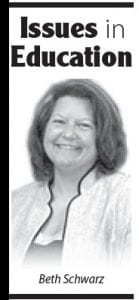With summer vacation rapidly approaching, I begin to worry about the summer slide. This isn’t the hot metal slide many of us remember from our childhood playgrounds, those have been replaced with much safer materials! Rather, it is a real academic phenomenon students experience to different degrees.
The three-month summer vacation is based on an antiquated school calendar designed to accommodate the needs of turn-of-the-century agriculture. Unfortunately, the calendar has become embedded in traditional education settings and results in academic regression now commonly referred to as the “summer slide.” Almost all students on a traditional calendar experience some regression during the long summer vacation, some more than others. By 9th grade, research suggests that the majority of the achievement gap between social and economic groups can be attributed to summer regression.
Some children have the opportunity to travel during the summer; this expands vocabulary and provides a multitude of learning experiences which help minimize the summer slide. Other students love to read and stretch their minds by reading several books over the summer. But, what if you don’t travel? What if your child isn’t an avid reader? Is there anything you can do? The answer, fortunately, is YES!
Turn everyday activities into teaching opportunities. Have students estimate at the grocery store, give your child a list of grocery items and have him/her find coupons for things you usually buy and then split the savings, work in the garden, help with household chores, etc.
Focus on reading, writing and mathematics. Watch for academic camps, many of them offer scholarships to low-income families or are geared specifically to minorities or girls. Don’t be afraid of the Internet. There are a number of excellent web sites with activities which promote learning in the core areas. <kahnacademy.com> is one example.
Visit our local museums and parks. Encourage your child to read the signs and descriptions. Better yet, give your child questions prior to the start of your adventure and see if he/she can find the answers.
Cooking is a great way to practice both math and reading. Try a new recipe together and while doing so, challenge your child to double or triple the recipe.
Encourage your child to try something different; perhaps try out for a part in a summer play, participate in a variety show, or take local classes through Community Education, the Art Colony, or North House Folk School.
Finally, my favorite suggestion, organize a community volunteer project with your child. This sharpens communication and collaborations skills, plus teaches civic responsibility.
Encourage your children to read, create and explore. The more of this they do, the shorter their summer slide will be!
Each month a representative of our local schools will offer thoughts in Issues in Education. This month’s contributor is Beth Schwarz, superintendent of School District 166.



Loading Comments